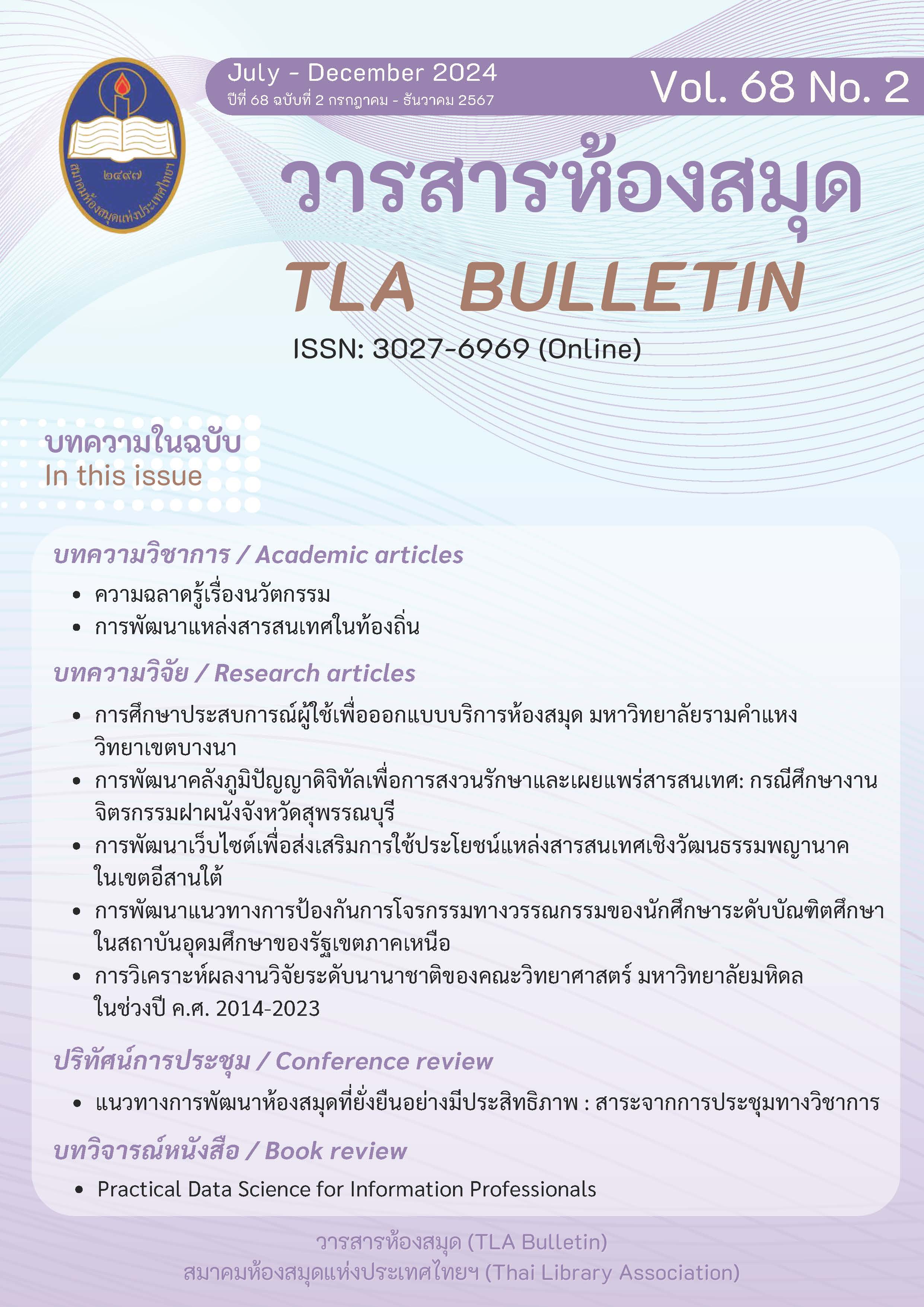การพัฒนาแนวทางการป้องกันการโจรกรรมทางวรรณกรรมของนักศึกษาระดับบัณฑิตศึกษาในสถาบันอุดมศึกษาของรัฐเขตภาคเหนือ
คำสำคัญ:
การโจรกรรมวรรณกรรม, นักศึกษาระดับบัณฑิตศึกษา, สถาบันอุดมศึกษาของรัฐบทคัดย่อ
งานวิจัยนี้ มีจุดมุ่งหมายเพื่อ 1) ศึกษาสภาพและปัจจัยที่ก่อให้เกิดแนวทางการป้องกันการโจรกรรมทางวรรณกรรมของนักศึกษา และ 2) พัฒนาแนวทางการป้องกันการโจรกรรมทางวรรณกรรมของนักศึกษา การวิจัยแบ่งเป็น 2 ระยะ คือ ระยะที่ 1 การศึกษาสภาพ และปัจจัยที่ก่อให้เกิดแนวทางการป้องกันการโจรกรรมทางวรรณกรรม ใช้ระเบียบวิธีวิจัยเชิงสำรวจ กลุ่มตัวอย่างเป็นนักศึกษาระดับบัณฑิตศึกษามหาวิทยาลัยของรัฐในเขตภาคเหนือ จำนวน 400 คน ได้มาโดยวิธีการสุ่มแบบหลายขั้นตอน เครื่องมือการวิจัยคือ แบบสอบถาม สถิติที่ใช้วิเคราะห์ข้อมูล ได้แก่ ค่าร้อยละ ค่าเฉลี่ย ส่วนเบี่ยงเบนมาตรฐาน และการวิเคราะห์องค์ประกอบเชิงสำรวจ ระยะที่ 2 การพัฒนาแนวทางการป้องกันการโจรกรรมทางวรรณกรรมสำหรับนักศึกษา กลุ่มตัวอย่างคือ ผู้เชี่ยวชาญ จำนวน 9 คน ได้มาโดยวิธีการเลือกแบบเจาะจง ใช้เทคนิคการสัมมนาอิงผู้เชี่ยวชาญ เครื่องมือวิจัยคือ ประเด็นการสัมมนาอิงผู้เชี่ยวชาญ และแบบสอบถามความคิดเห็นเกี่ยวกับคุณภาพของแนวทางการป้องกันโจรกรรมทางวรรณกรรมของนักศึกษา วิเคราะห์ข้อมูลโดยใช้การวิเคราะห์แบบอุปนัย และสถิติแบบพรรณนา ผลการวิจัยพบว่า 1) นักศึกษาระดับบัณฑิตศึกษามีความรู้ความเข้าใจเกี่ยวกับการโจรกรรมทางวรรณกรรมโดยภาพรวมในระดับมาก นักศึกษามีพฤติกรรมการโจรกรรมทางวรรณกรรมโดยภาพรวมอยู่ในระดับปานกลาง สาเหตุการโจรกรรมทางวรรณกรรมของนักศึกษาเกิดจากปัจจัยภายในตัวบุคคลในระดับมาก ได้แก่ ขาดทักษะด้านภาษาอังกฤษ ต้องการได้เกรด/คะแนนที่ดี และชอบความสะดวกสบาย ปัจจัยที่ก่อให้เกิดแนวทางการป้องกันการโจรกรรมทางวรรณกรรมของนักศึกษามี 3 องค์ประกอบ คือ องค์ประกอบที่ 1 การป้องกัน องค์ประกอบที่ 2 การตระหนักรู้ และองค์ประกอบที่ 3 การสนับสนุน ซึ่งทั้ง 3 องค์ประกอบร่วมกันอธิบายตัวแปรปัจจัยที่ก่อให้เกิดแนวทางการป้องกันการโจรกรรมทางวรรณกรรมได้ร้อยละ 70.139 และ 2) แนวทางการป้องกันการโจรกรรมทางวรรณกรรมของนักศึกษามี 3 แนวทาง ได้แก่ แนวทางที่ 1 การป้องกัน แนวทางที่ 2 การให้ความตระหนักรู้ และแนวทางที่ 3 การสนับสนุน
Downloads
เอกสารอ้างอิง
Abukari, Z. (2016). Awareness and incidence of plagiarism among students of higher education: A case study of Narh-BitA College. [Master’s thesismaster, The University of Ghana]. https://ugspace.ug.edu.gh
Anney, V.N., & Mosha, M.A. (2015). Student’s plagiarisms in higher learning institutions in the era of improved internet access: Case study of developing countries. Journal of Education and Practice, 6, 203-216.
Bunyakiat, K. (2011). Plagiarism. Chulalongkorn University Press (cuprint). [In Thai]
Chen, Y., & Chou, C. (2015). Are we on the same page? College students’ and faculty perception of student plagiarism in Taiwan. Ethics & Behavior, 27(1), 53-73. DOI: 10.1080/10508422.2015.1123630
Devlin, M. (2014). Policy, preparation and prevention: Proactive minimization of student plagiarism. Journal of Higher Education Policy Management, 28(1), 45-58.
Ison, D.C. (2014, June). Does the online environment promote plagiarism? A comparative study of dissertation from Brick-and-Mortar versus online institutions. MERLOT Journal of Online Learning and Teaching, 10(2), 272-282. https://jolt.merlot.org/vol10no2/ison_0614.pdf
Mahmound, M. A., Mahfoud, Z. R., Ming-Jung Ho and Shatzer, J. (2020). Faculty perceptions of student plagiarism and interventions to tackle it: A multiphase mixed-methods study in Qatar, BMC Medical Education, 7. https://doi.org/10.1186/s12909-020-02205-2
Malik, M.A., Mahroof, A., & Ashraf, M.A. (2021). Online university students’ perceptions on the awareness of, reasons for, and solutions to plagiarism in higher education: The development of the AS&P model to combat plagiarism. Applied Sciences , 11(12055) https://doi.org/10.3390/app112412055
Onyemelukwe, I. M. (2020). Plagiarism or academic theft: Typology, indicators and the way out. International journal of Applied and Natural Sciences (IJANS), 8(20), 9-26. https://www.researchgate.net/publication/341050084
Palmer, A. (2021). Investigathing staff views on plagiarism in tranantional higer education. Journal of Applied Learning & Teaching. 4(2), 13-27. http://journals.sfu.ca/index.php/jalt/index.
Rochana-Aree, M. (2016). Academic fraud: Criminalization of academic ghost-writer in higher education. [Master’s thesis, Thammasat University]. https://tdc.thailis.or.th/tdc/browse.php?
The Research Guide Association [ARGA]. (2024). Plagiarism statistics. https://argassociation.org/plagiarism-statistics/
Selemani, A., Chawinga, W. D. & Dube, G. (2018). Why do postgrate students commit plagiarism? An empirical study. International Journal for Educational Integrity, 14(7), 1-15. https://doi.org/10.1007/s40979-018-0029-6
Srisongkram, W. (2011). Development of plagiarism understanding of undergraduate students based on survey research and documentary analysis results. [Doctoral dissertation, Chulalongkorn Unversity]. https://tdc.thailis.or.th/tdc/browse.php. [In Thai]
ThaiPublica. (2012, 22 June). For the first time in history, Chulalongkorn University Council withdraws Ph.D. degree from “Supachai Lorhakarn” does not have retroactive effects. “Bowsak” explains that in the past he may have used it honestly. Retrieved July 11, 2024, form https://thaipublica.org/2012/06/plagiarism-5/
Torres-Diaz, J. C., Duart, J. & Hinojosa-Becerra, M. (2018). Plagiarism, internet and academic success at the university. Journal of New Approaches in Educational Research, 7(2), 98-104. doi:10.7821/nare.2018.7.324.
ดาวน์โหลด
เผยแพร่แล้ว
รูปแบบการอ้างอิง
ฉบับ
ประเภทบทความ
สัญญาอนุญาต
ลิขสิทธิ์ (c) 2024 วารสารห้องสมุด สมาคมห้องสมุดแห่งประเทศไทยฯ

อนุญาตภายใต้เงื่อนไข Creative Commons Attribution-NonCommercial-NoDerivatives 4.0 International License.




